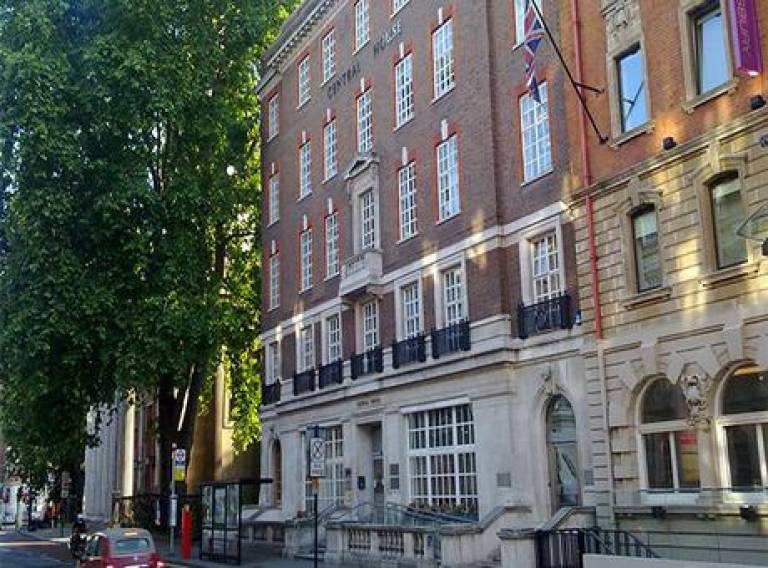Self-funded PhD: The role of lighting in buildings on the circadian regulation of the elderly
4 August 2016
The UCL Institute for Environmental Design and Engineering invites applications for a non-funded PhD.

The role of daylight and lighting controls in buildings on the circadian regulation of the elderly population
Supervisors: Mr Peter Raynham, Senior Lecturer in Light and Lighting, UCL IEDE, and; Dr Jemima Unwin, Lecturer in Light and Lighting, UCL IEDE.
Start Date: January 2017
Expected length: 3 years
You will have to meet the UCL’s English Language Requirements
UCL full time fees for academic year 2016/17:
UK/EU: £4,770
Overseas: £18,670
Overview:
Background
The aim of this project is to define the role of daylight in buildings on the circadian regulation of an older age group within which this is known to be a problem. This will involve extensive study of an elderly population above seventy years old in care home environments, including participants with early onset dementia and limited visual acuity. The advantages of daylight provision in circadian regulation are unquestioned as it provides high retinal illuminance and information about the external environment, however the required dose is unknown. Once the dosage and characteristics of daylight which matter are identified then this information can be used to inform design decisions regarding the characteristics of electric lighting required to support this. Current lighting control systems provide unprecedented flexibility as each LED chip can be programmed individually allowing easy adjustment of spectral content. What to do with the many options is unclear as there is no evidence to support the health benefit claims made by manufacturers. Therefore the findings of this project will also provide clarity on how to optimise lighting controls for human need.
Scope of works
A pilot study will examine to what extent participants self-select their environment (by choosing a chair by the window). Following this analysis participants will complete tasks testing alertness designed to consider their visual needs which may be administered on a tablet/ipad. The main study will take place over one year to consider seasonal effects. By observing the movement patterns of the elderly and comparing this to their alertness, the amount of daylight received can be measured and the impact on alertness at intervals throughout the day and year quantified. The aim is to answer key questions regarding the light/dark cycle, such as whether the amplitude (how dark should dark be and how light should light be), and duration (how long exposure to daylight and darkness should be) matter. This information is essential to inform building envelope and electric lighting control design decisions in the planning of environments to support wellbeing. This is a good opportunity for talented students to work with a network of academics in the built environment field giving unparalleled access to knowledge and professional contacts.
Person Specification:
The project is well-suited to a highly motivated individual with strong interpersonal and organisational skills, backed up by experience in quantitative analysis. Students should have a UK bachelor's degree in a relevant subject or a closely-related discipline, awarded with first-class or upper second-class (2:1) honours, or an overseas qualification of an equivalent standard from a recognized higher education institute. For those applicants with a first or 2:1, possession of a master's degree in architecture, engineering, biology, neuroscience or related disciplines is highly desirable. Candidates without a master's degree may be admitted in exceptional cases where suitable research experience can be demonstrated.
The successful candidate is expected to possess the following qualities:
• Excellent analytical skills.
• Self-motivated researcher willing to develop personally and professionally.
• Ability to use own initiative and prioritize workload.
• Good interpersonal and communication skills (oral and written).
• Strong organizational skills.
• Demonstrate a high level of attention to detail in his/her working methods.
Application Procedure
A two-stage application procedure is in place.
Stage 1
In Stage 1, you are required to submit the following pre-application documents:
(1) CV;
(2) Academic Transcripts;
(3) a 1-page personal statement outlining motivation, interest and eligibility for the post;
(4) Name and contact details of those providing an academic reference for you – references will not be taken at this stage; and,
(5) (optional) copies of the two most important pieces of research work you have completed. Please state clearly your contribution in case of jointly authored work.
All Stage 1 application documents should be emailed to Mae Oroszlany at e.oroszlany@ucl.ac.uk
Informal enquiries on the content of the studentship research topic can be made to Dr Jemima Unwin (jemima.unwin@ucl.ac.uk).
Please note that if English is NOT your first language, you will need to provide evidence that you meet the UCL's English Language requirements
The closing date for the receipt of completed Stage 1 applications is: Thursday, 1 OCTOBER 2016.
Shortlisted applicants will be invited to an interview, which will take place shortly after stage 1 application deadline.
Stage 2
Following the interview, the successful candidate will be invited to make a formal application to the UCL PhD Programme. Further guidance will be provided. Follow this link for more information.
Any offer made will be subject to references and proof of meeting the UCL English language requirements.
Expected start date: Early 2017
 Close
Close

